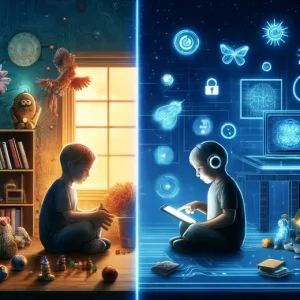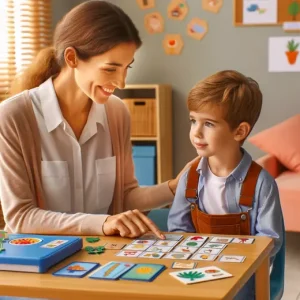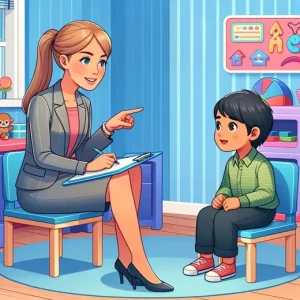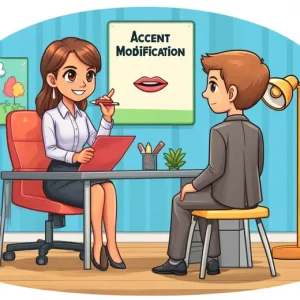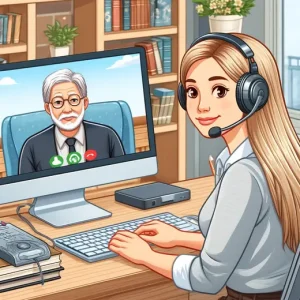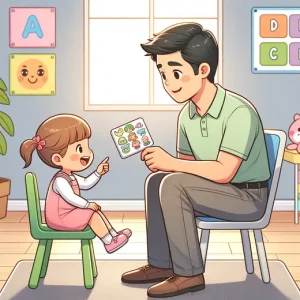Social Communication Disorder: A Quick and Easy Guide
By Rajini D
Last Updated: February 7, 2024
Have you ever wondered why some individuals find it challenging to engage in conversations, interpret social cues, or struggle to form meaningful relationships? It might be due to a less commonly understood condition known as Social Communication Disorder (SCD).
SCD is a condition marked by difficulties in using verbal and nonverbal language in social contexts. Unlike what some might think, it’s not just about shyness or being introverted. People with SCD understand language but often grapple with the subtleties of social communication — things like picking up on sarcasm, initiating conversations, or interpreting body language can be challenging for them.
One common misconception is that Social Communication Disorder is synonymous with Autism Spectrum Disorder (ASD). While there are overlaps, particularly in social communication challenges, SCD is distinct. It doesn’t encompass the broader range of symptoms seen in ASD, such as restricted interests or repetitive behaviors. This distinction is crucial for understanding and supporting individuals with SCD effectively.
Understanding Social Communication Disorder
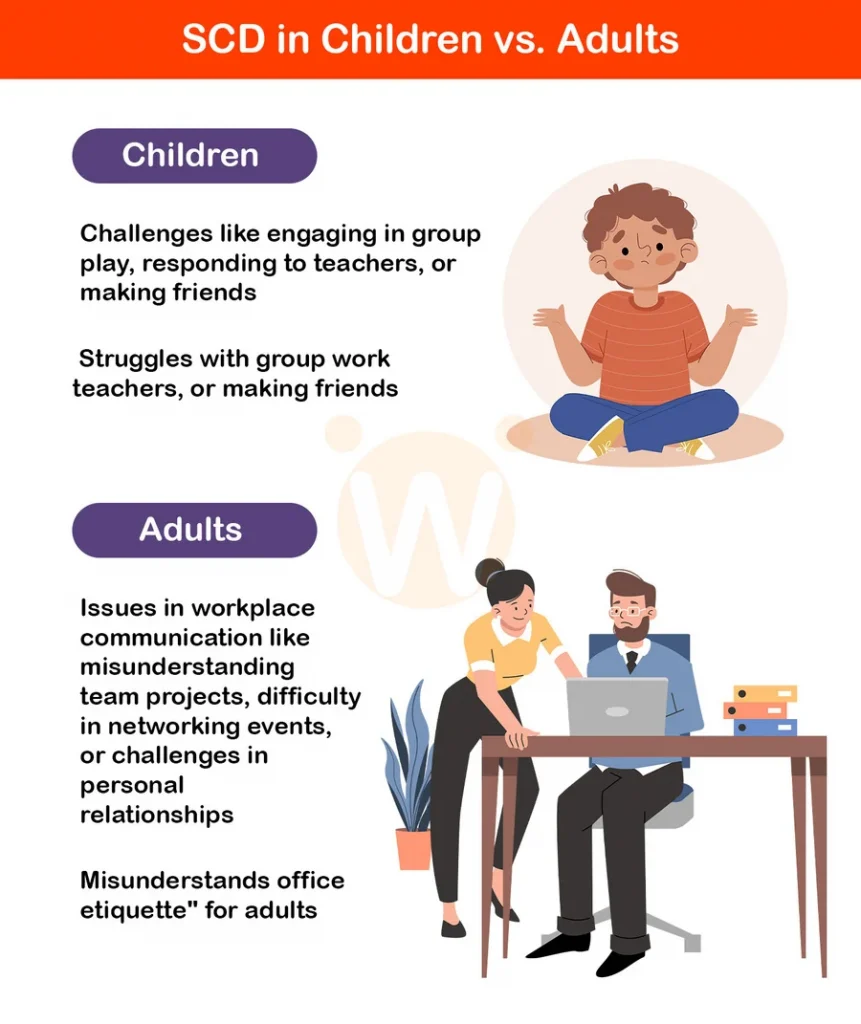
What Exactly is Social Communication Disorder?
Imagine having a map with all the routes but struggling to understand the signs along the way. That’s a bit like Social Communication Disorder (SCD). It’s a condition where individuals find it hard to use language effectively in social situations. They might have the words, but using them appropriately in conversations, understanding jokes, or reading between the lines can be challenging.
SCD involves difficulties with both verbal and nonverbal aspects of communication. This includes challenges in understanding what others mean, not just what they say, and using language appropriately for different social contexts – like knowing how to talk differently with a friend compared to a teacher.
SCD vs. Other Communication Disorders
While SCD shares features with other disorders, it’s unique. Unlike Autism Spectrum Disorder (ASD), where challenges in social communication are often accompanied by repetitive behaviors or narrow interests, SCD focuses solely on communication issues. Also, it’s different from speech disorders that impact the physical ability to speak. People with SCD generally don’t have trouble forming words or sentences; their challenge lies in using these effectively in social interactions.
Learn more about how SCD differs from other language disorders
Recognizing the Signs: Symptoms of SCD
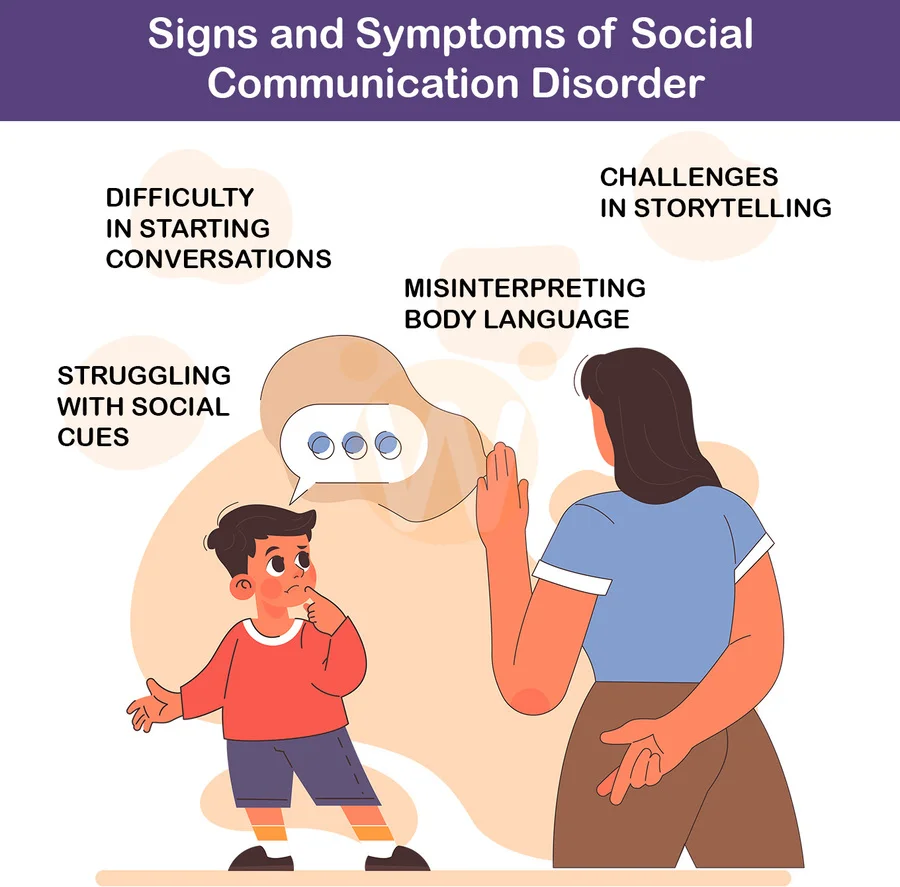
Common Symptoms of Social Communication Disorder
Recognizing SCD involves being aware of various symptoms that manifest in daily life. These include:
Difficulty with Conversational Skills: Struggling to start or keep up with conversations, misunderstanding jokes or sarcasm, or having trouble with staying on topic.
Challenges in Understanding Nonverbal Cues: Difficulty in interpreting body language, facial expressions, or tone of voice.
Inappropriate Responses: Responding in ways that seem off-topic or not understanding implied meanings in conversations.
Storytelling Troubles: Having a hard time understanding or narrating stories, especially those with implicit meanings or requiring an understanding of the listener’s perspective.
Social Interaction Difficulties: They might seem disinterested in interacting with others or find it hard to develop and maintain relationships.
Explore our insights on speech delays if you’re concerned about a child’s language development.
How These Symptoms Show Up in Daily Life
Imagine being in a social gathering where everyone is laughing at a joke, but you can’t figure out why it’s funny. Or you’re in a group, and despite wanting to contribute, you’re not sure how or when to jump into the conversation. These are everyday scenarios for someone with SCD. It’s not about the lack of desire to communicate or socialize; it’s about the challenge of navigating these social landscapes.
Causes Behind Social Communication Disorder: What We Know So Far
Unraveling the Mystery of SCD’s Causes
When it comes to understanding the causes of Social Communication Disorder (SCD), think of a puzzle where we’re still trying to fit all the pieces together. Researchers are actively exploring this area, and while we don’t have all the answers yet, we’ve made significant strides in understanding potential causes.
Discover more on warning signs in child development – Early identification of developmental issues is key.
The Role of Genetics and the Environment
One of the key areas of focus is genetics. Like many other developmental conditions, SCD may have a genetic component. This doesn’t mean that if a family member has SCD, you will definitely have it too. It’s more about an increased likelihood, a subtle yet significant difference.
Environmental factors also play a role. These can range from prenatal influences to the child’s early social and language exposure. It’s like a dance between nature and nurture, where both genetics and environment contribute to the development of SCD.
The Ongoing Quest for Answers
Current research is like a detective story, with scientists examining everything from brain development to social experiences. They’re piecing together clues to build a more comprehensive understanding of SCD. This research is vital, as it guides effective treatments and support strategies.
Diagnosing Social Communication Disorder
Navigating the Diagnosis Process
Diagnosing SCD is a bit like being a detective. It involves gathering clues from various sources to put together the whole picture. It’s not something that can be determined from a single test or observation. It requires a comprehensive approach, considering various aspects of an individual’s communication and behavior.
For those seeking an assessment or therapy, our online speech therapy services can be a starting point.
The Importance of Professional Assessment
This is where professionals like speech-language pathologists come in. They use a combination of observation, interviews, and standardized tests to assess social communication skills. It’s crucial to get this professional assessment, as it helps in distinguishing SCD from other conditions like Autism Spectrum Disorder or language impairments.
Finding Guidance and Support
If you’re concerned about SCD, whether for yourself, your child, or someone you know, it’s essential to seek professional guidance. This is where Wellness Hub can be a valuable resource. Although we don’t directly diagnose SCD, we can connect you with professionals and provide supportive resources. Our goal is to guide you through this journey, offering a helping hand and a listening ear.
Treatment and Management Strategies for Social Communication Disorder
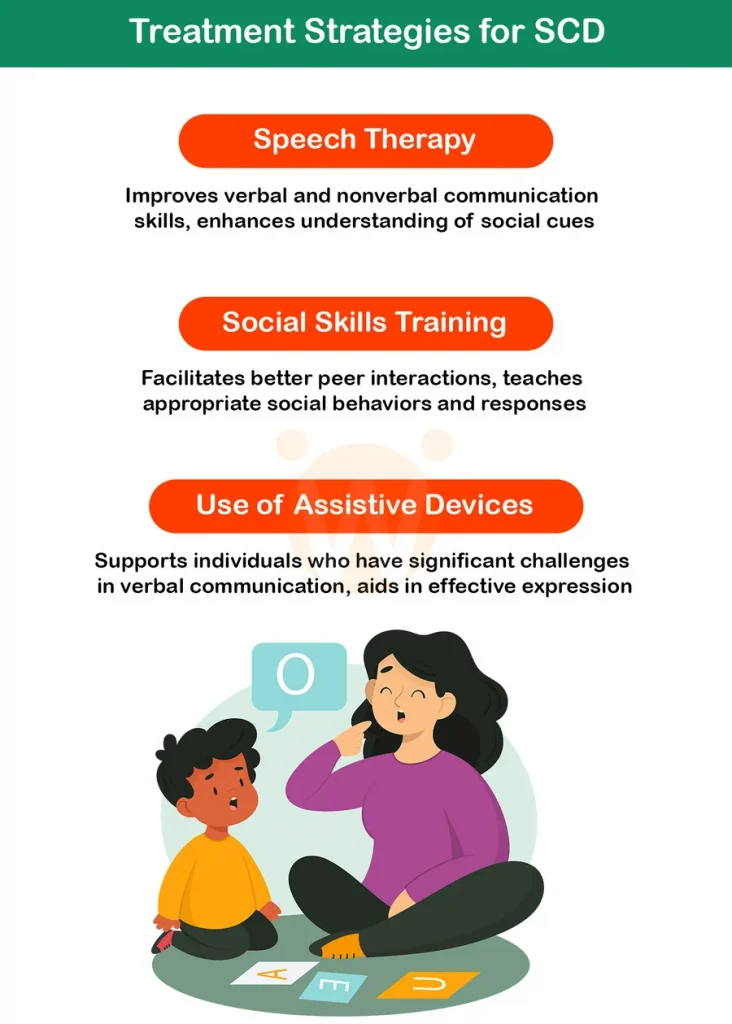
The Role of Speech and Language Therapy
When we talk about treating Social Communication Disorder (SCD), speech and language therapy is often at the forefront. Think of it as a toolbox filled with various techniques and exercises tailored to help individuals enhance their communication skills. This therapy focuses not just on the ability to form words and sentences but more on using language effectively in social situations – like making small talk, understanding jokes, or interpreting non-verbal cues.
Speech therapists work on developing these skills through engaging activities tailored to each person’s needs. It’s a process of building confidence and competence in social communication, one step at a time.
Read our detailed guide To understand more about how speech and language therapy
Social Skills Training: A Key Component
Another vital piece of the puzzle is social skills training. This training involves teaching individuals with SCD how to interpret social cues, engage in conversations, and understand the unspoken rules of social interactions. It’s like giving them a map to navigate the social world.
The benefits of social skills training are far-reaching. It can help improve peer relationships, boost self-esteem, and enhance overall quality of life. These sessions often involve role-playing, group activities, and real-world practice – all aimed at making social interactions less daunting and more enjoyable.
Navigating Daily Life with Social Communication Disorder
Guidance for Parents and Caregivers
If you’re a parent or caregiver of someone with SCD, you play a crucial role in their journey. The key is to create an understanding and supportive environment. Encourage communication without pressure, be patient with their progress, and celebrate their successes, no matter how small.
Find helpful parenting Tips for Parenting an Autistic Child
Creating a Supportive Environment
A supportive environment is where individuals with SCD feel safe to express themselves and practice their communication skills. This can mean adapting your communication style to meet their needs or helping them prepare for social situations in advance. It’s all about understanding, patience, and providing the right support at the right time.
Wellness Hub: A Partner in Your Journey
While navigating the complexities of SCD can feel overwhelming, remember that you’re not alone. Wellness Hub is here to support you. With a wealth of resources and connections to professionals, we can help guide you through this journey. Whether you’re looking for advice, support, or professional services, Wellness Hub can be a part of your supportive network, making the path a little easier to tread.
Challenges and Strategies for Managing SCD in Various Settings
| Setting | Common Challenges with SCD | Effective Management Strategies |
|---|---|---|
| Home | Difficulty in family and interactions, challenges in expressing emotions appropriately. | Establishing a routine for communication, using visual aids, and creating a supportive and patient family environment. |
| School | Struggles with peer relationships, following classroom rules, and participating in group activities. | Collaborating with educators for tailored support, implementing IEP (Individualized Education Program) strategies, and peer-mediated interventions. |
| Social Gatherings | Overwhelm in group settings, difficulty initiating and maintaining conversations. | Role-playing social scenarios, practicing conversation skills, and gradual exposure to social settings. |
| Workplace | Challenges in teamwork, understanding workplace etiquette, and managing professional relationships. | Workplace accommodations, communication skills training, seeking mentorship or guidance. |
| Online Interactions | Misinterpreting digital communication and cues, challenges in expressing oneself clearly in texts or emails. | Learning netiquette, using clear and direct communication, and seeking clarification when needed. |
Understanding Social Communication Disorder in Children
Navigating the Unique Challenges in Children
Social Communication Disorder (SCD) can be particularly challenging for children. They might struggle with making friends, participating in group activities, or simply having a conversation with their peers. These challenges often stem from difficulties in understanding social cues, taking turns in conversation, and interpreting body language or facial expressions.
For children with SCD, everyday interactions that come naturally to others can feel confusing and overwhelming. It’s like being in a play where everyone else knows their lines, and you’re left trying to improvise.
The Crucial Role of Early Intervention
Early intervention is key when it comes to SCD in children. The sooner we recognize the signs and start addressing them, the better the outcomes can be. Early intervention can include speech and language therapy, social skills training, and educational support.
Recognizing the signs early on – such as delays in speech development, difficulty in playing with other children, or challenges in understanding social rules – can make a significant difference. It’s about giving these children the tools they need to navigate their social world more effectively.
Learn more about The Crucial Role of Parents in Online Speech Therapy
Benefits of Early Intervention for Social Communication Disorder
| Age Range | Benefits of Early Intervention |
|---|---|
| Toddlers (1-3 years) | – Development of basic communication skills. – Improved social engagement with peers and caregivers. – Early recognition and adaptation to social cues. – Reduction in frustration due to communication challenges. |
| Preschool (3-5 years) | – Enhanced peer interactions, fostering better social skills. – Preparation for school environment, reducing future academic struggles. – Development of a better understanding of social norms and expectations. – Improved ability to express needs and emotions effectively. |
| School-age (6-12 years) | – Better academic performance through improved communication. – Increased self-esteem and confidence in social situations. – Development of lasting friendships and social networks. – Enhanced problem-solving and coping skills in group settings. |
Social Communication Disorder and Adults
Dispelling the Myth: SCD is Not Just a Childhood Disorder
It’s a common misconception that Social Communication Disorder is only a childhood issue. However, adults can and do experience SCD. For adults, the challenges might manifest in workplace communication, social interactions, or even in forming and maintaining personal relationships.
Adults with SCD might find it hard to interpret sarcasm, engage in small talk, or understand the unspoken ‘rules’ of social conduct. These challenges can lead to misunderstandings and frustration in daily life.
Support Strategies for Adults with SCD
For adults navigating SCD, support, and strategies can vary. Speech and language therapy can still be beneficial, focusing on advanced communication skills relevant to adult life. Support groups and therapy can also provide a safe space to develop and practice social skills.
Adults with SCD can also benefit from our online counselling services
Conclusion
SCD, characterized by challenges in using verbal and nonverbal language in social contexts, is a condition that affects both children and adults. Recognizing the signs early, understanding the unique challenges, and seeking appropriate intervention can significantly improve communication skills and overall quality of life.
Remember, while the journey with SCD might seem daunting, it is filled with possibilities for growth and improvement. Speech and language therapy, social skills training, and assistive communication devices are valuable tools in this journey. They offer a way to navigate the challenges and turn them into opportunities for learning and connection.
At Wellness Hub, we are committed to supporting individuals and families navigating SCD. Our resources, connections to professionals, and supportive community are here to guide you, offering a beacon of hope and understanding. Whether you’re a parent seeking help for your child, an adult facing your own challenges with SCD, or just someone looking to understand more, Wellness Hub is your partner in this journey.
Frequently Asked Questions:
1. What is Social Communication Disorder (SCD)?
Social Communication Disorder is a condition characterized by difficulty in using verbal and nonverbal communication effectively in social settings. It involves challenges with understanding social cues, following conversation rules, and adapting communication in different contexts.
2. How is Social Communication Disorder different from Autism?
Unlike Autism Spectrum Disorder, SCD is specifically focused on difficulties with social communication and does not typically include restricted interests or repetitive behaviors. While there are overlaps in social communication challenges, the two are distinct conditions.
3. What are the signs of Social Communication Disorder in children?
Signs in children include difficulty in starting conversations, interpreting body language, understanding jokes or sarcasm, struggling with social interactions, and forming friendships.
4. Can adults be diagnosed with Social Communication Disorder?
Yes, adults can also have Social Communication Disorder. It can manifest as challenges in workplace communication, social interactions, and maintaining personal relationships.
5. What treatments are available for Social Communication Disorder?
Treatment options include speech and language therapy, social skills training, and possibly the use of assistive communication devices. These approaches are tailored to the individual’s needs to improve their communication skills.
6. Why is early intervention important for Social Communication Disorder?
Early intervention is crucial as it can lead to better outcomes. Starting treatment early helps in developing effective communication skills, which are important for social and academic success.
7. How can Wellness Hub help those with social communication disorders?
Wellness Hub offers resources and connects individuals with professionals specializing in SCD. We provide support for families and individuals, guiding them towards effective treatments and management strategies.
8. Are there support groups for Social Communication Disorder?
Yes, there are support groups for individuals and families affected by SCD. These groups offer a platform to share experiences, learn from others, and gain emotional support.
9. Can speech and language therapy really help with Social Communication Disorder?
Absolutely. Speech and language therapy is a crucial part of treatment for SCD. It focuses on improving communication skills, understanding social cues, and enhancing the ability to interact effectively in social situations.
10. How can I support a child with Social Communication Disorder?
Supporting a child with SCD involves creating a supportive and understanding environment, encouraging communication, being patient with their progress, and seeking professional help for tailored intervention strategies.
About the Author:
Rajini, Speech-Language Pathologist:
Rajini is a dedicated Speech-Language Pathologist focusing on developmental speech and language disorders in children and rehabilitation in adults. With a passion for helping each individual find their voice, Rajini brings a wealth of experience and a heartfelt approach to therapy. At Wellness Hub, she’s part of a team that values innovation, compassion, and results-driven practices.
Book your Free Consultation Today
Parent/Caregiver Info:
Client’s Details:
* Error Message
